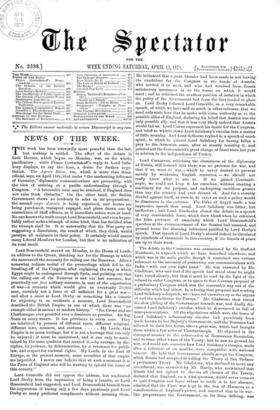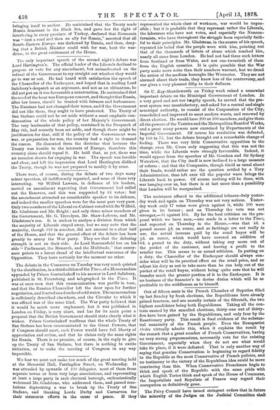The debate in the Commons was commenced by Sir Stafford
Northcote, in a speech which we have described elsewhere, and which was in the main pacific, though it contained one curious reference to the necessity of protecting our communications with India "with our own right hand." He was answered by Mr. Gladstone, who said that if the speech had stood alone he might have voted silently, but that it must be read by the light of the refusal to enter Congress, or to agree to that German proposal of a preliminary Congress which was the reasonable way out of the difficulty which had arisen. In refusing that proposal and sending Lord Salisbury's despatch, we" have set ourselves up as the organs of and the substitutes for Europe." Mr. Gladstone then traced the slow gliding of the Government towards war, and finally dis- cussed Lord Salisbury's circular, which he denounced as full of misrepresentations. All the stipulations which were the bases of Lord Salisbury's inflammatory circular had previously been made known to her Majesty's Government, and the Russians had adhered to their first terms, after a great war, which had brought them within a few miles of Constantinople. Ile objected in the strongest manner to the retrocession of Roumanian Bessarabia, and to some other terms of the Treaty ; but he saw no ground for war, and could not conceive how Lord Salisbury's charges, made after a reticence of six months, were compatible with national honour. He held that Government should accept the Congress, which Russia had accepted in calling the Treaty of San Stefano a preliminary Treaty. Mr. Gladstone, who declined to move any amendment, was answered by Mr. Hardy, who maintained that Russia had not agreed to discuss all clauses of the Treaty, declared that England, on a vital question, would never consent to quit Congress and leave others to settle it in her absence, admitted that the Fleet was kept in the Sea of Marmora as a manifestation of England's power, and asserted that in its war- like preparations the Government, so far from drifting, was bringing itself to anchor. He maintained that the Treaty made Russia dominant in the Black Sea, and gave her the right of interfering in every province of Turkey, declared that Roumania was "first a road and then an ally for Russia," asserted that all South-Eastern Europe was darkened by Russia, and then, deny- ing that a British Minister could wish for war, beat the war- drum, to the great excitement of the House.



































